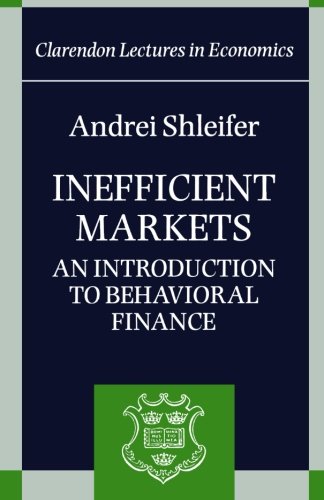En oferta
Inefficient Markets
The efficient markets hypothesis has been the central proposition in finance for nearly thirty years. It states that securities prices in financial markets must equal fundamental values, either because all investors are rational or because arbitrage eliminates pricing anomalies. This book
describes an alternative approach to the study of financial markets: behavioral finance. This approach starts with an observation that the assumptions of investor rationality and perfect arbitrage are overwhelmingly contradicted by both psychological and institutional evidence. In actual
financial markets, less than fully rational investors trade against arbitrageurs whose resources are limited by risk aversion, short horizons, and agency problems. The book presents models of such markets. These models explain the available financial data more accurately than the efficient markets
hypothesis, and generate new predictions about security prices. By summarizing and expanding the research in behavioral finance, the book builds a new theoretical and empirical foundation for the economic analysis of real-world markets.
-
Especialidad

-
Información general
- Formato Impreso
- Acabado Tapa rústica
- Año de publicación 2000
- Editorial Oxford U. P.
- Autor Shleifer, A.
- Páginas 224
- ISBN 9780198292272
- Edición 21ª
The efficient markets hypothesis has been the central proposition in finance for nearly thirty years. It states that securities prices in financial markets must equal fundamental values, either because all investors are rational or because arbitrage eliminates pricing anomalies. This book
describes an alternative approach to the study of financial markets: behavioral finance. This approach starts with an observation that the assumptions of investor rationality and perfect arbitrage are overwhelmingly contradicted by both psychological and institutional evidence. In actual
financial markets, less than fully rational investors trade against arbitrageurs whose resources are limited by risk aversion, short horizons, and agency problems. The book presents models of such markets. These models explain the available financial data more accurately than the efficient markets
hypothesis, and generate new predictions about security prices. By summarizing and expanding the research in behavioral finance, the book builds a new theoretical and empirical foundation for the economic analysis of real-world markets.
Escribir Su propia reseña
Productos relacionados
-
 Pack Fund. De Farmac. En Terapéutica 7ª +Mnl. Practico Consulta Terapéutica 2ª
Pack Fund. De Farmac. En Terapéutica 7ª +Mnl. Practico Consulta Terapéutica 2ªNovedad
Pack
Año: 2025 Autores: Machado-IsazaPrecio Celsus COP $116.000 Precio Lista COP $148.000
-
 Pack Pabón Urgencias Medicas Protocolo De Act. + Mnl. Practico Consulta Terapeutica 2ª
Pack Pabón Urgencias Medicas Protocolo De Act. + Mnl. Practico Consulta Terapeutica 2ªPack
Año: 2025 Autores: Pabón Y MachadoPrecio Celsus COP $193.750 Precio Lista COP $231.000
-
 Pack Pediatría Diagnóstico y Tratamiento 3ª + Pautas De Recién Nacidos 6ª
Pack Pediatría Diagnóstico y Tratamiento 3ª + Pautas De Recién Nacidos 6ª
Año: 2023 Autores: Sarmiento Y HoyosPrecio Lista COP $184.000
-
 Miller Anestesia, 2 Vols
Miller Anestesia, 2 Vols
Año: 2021 Autores: Gropper, M.Precio Celsus COP $1.295.000 Precio Lista COP $2.590.000
Agotado -
 Atlas of Pulmonary Pathology
Atlas of Pulmonary Pathology
Año: 2021 Autores: Butt, Y.Precio Celsus USD $230 Precio Lista USD $270
-
 Pack Amir Medicina 2020 Cartilla + Amir Test 5 Y Amir Test 6
Pack Amir Medicina 2020 Cartilla + Amir Test 5 Y Amir Test 6
Año: 2020 Autores: AmirPrecio Lista COP $140.000
-
 Manual De Medicina Legal Y Forense Para Estudiantes De Medicina.
Manual De Medicina Legal Y Forense Para Estudiantes De Medicina.
Año: 2020 Autores: MenéndezPrecio Celsus COP $112.500 Precio Lista COP $225.000
-
 Guía Mosby De Habilidades Y Procedimientos En Enfermería .
Guía Mosby De Habilidades Y Procedimientos En Enfermería .
Año: 2019 Autores: PerryPrecio Celsus COP $122.500 Precio Lista COP $245.000
Agotado -
 Agentes Físicos En Rehabilitación .
Agentes Físicos En Rehabilitación .
Año: 2019 Autores: CameronPrecio Celsus COP $201.000 Precio Lista COP $401.000
Agotado -
 Nutrición Y Dietética Clínica + Contenido Digital .
Nutrición Y Dietética Clínica + Contenido Digital .
Año: 2019 Autores: SalasPrecio Celsus COP $226.000 Precio Lista COP $452.000
-
 Enarm 2 Amir Endocrinología, Inmunología, Hematología, Reumatología, Infecciosas, Microbiología
Enarm 2 Amir Endocrinología, Inmunología, Hematología, Reumatología, Infecciosas, Microbiología
Año: 2019 Autores: AmirPrecio Celsus COP $20.000 Precio Lista COP $88.000
Agotado

